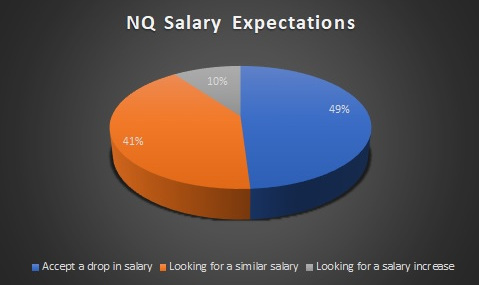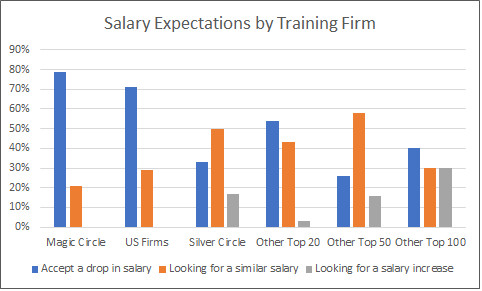
Google a law firm’s name followed by ‘NQ’ and the auto fill will suggest ‘Law Firm NQ Salary’ as the top option. Why? Because the industry puts a huge emphasis on remuneration, particularly at junior level.
Large law firms publish their NQ salaries because they want to recruit the brightest and best aspiring lawyers into their training schemes and retain the best NQs upon qualification.
It’s just one part of the ‘battle for talent’ at the junior lawyer level, but certainly the most visible. There is fierce competition between law firms for the best junior lawyers, and the disparity between NQ pay levels at these firms is something that is regularly highlighted in the legal press.
At the end of 2016, Slaughter and May, which had hitherto paid the lowest NQ salaries among the magic circle, announced a 9% increase for NQs, which edged them ahead of Linklaters, but still left them some way behind Clifford Chance and Freshfields. Linklaters responded in June this year by upping their NQ salaries by £1,000 a year, taking them slightly above Slaughter and May once again.
But is the salary on offer as an NQ or junior lawyer as important as we think it is?
We’ve made a thorough analysis of the data that we collect at NQSolicitors.com, and it seems that the answer is ‘yes’, but only to a point. And on the whole, the data suggests that the largest law firms, particularly those within the top 20 UK law firms, are putting too much emphasis on salaries.
We analysed the ‘minimum salary‘ responses of candidates for whom we had an accurate idea of the NQ salary on offer at the firm at which they were training at the time they created their profiles. The sample includes only those candidates that created their profiles prior to qualifying, and therefore does not include candidates at NQ-2 PQE.
Thought all lawyers are money obsessed? Think again.
The pie chart below shows the responses of all final seat trainees, who were training at top 100 UK law firms and US law firms.
- 49% of candidates were happy to be matched with NQ vacancies that would pay at least 10% less than the salary on offer at their training firm
- 41% wanted to be matched with NQ vacancies that would pay a salary which is at least broadly similar to the salary on offer at their training firm
- 10% only wanted to be matched with NQ vacancies that pay at least 10% more than the salary on offer at their training firm

These results might take quite a few of you by surprise, however, the really interesting results appear when you break the results down a little more.
The bar chart below shows the same statistics, but broken down per band of law firm.

Magic circle and US firms
At the time of creating their profile on NQSolicitors.com, zero percent of final seat trainees at magic circle and US firms only want to be matched with NQ vacancies that pay at least 10% more than the salary on offer at their training firm.
This is not really surprising for those who trained at US firms as they are the highest payers, but it is more of a shock that, in our sample, no magic circle trainees were only prepared to look upwards with regard to their minimum salary.
A higher than expected percentage of magic circle trainees (79%), were prepared to take a drop in salary of at least 10% upon moving firm, compared to 49% of the sample as a whole. This is probably due to them having accepted that their salary is likely to reduce unless they join a large US firm or another member of the magic circle.
The remainder (21%), wanted to be matched with NQ vacancies that would pay a salary which is at least broadly similar to the salary on offer at their training firm.
Silver circle firms (Ashurst, Berwin Leighton Paisner, Herbert Smith Freehills, Macfarlanes and Travers Smith)
It is very interesting to note the difference in attitude in relation to minimum salary between magic circle and silver circle trainees, especially when you consider that four of the five silver circle firms pay their NQs in excess of £72,000 per annum, with Herbert Smith Freehills paying their NQs more than two of the magic circle.
Nearly a fifth of candidates who were training at silver circle firms (17%), would like a position that offers an increase in salary.
Half of silver circle trainees wanted at least similar pay and just 33% would be prepared to accept a drop in salary, compared to 79% of magic circle trainees.
The inference from the data is that a significant percentage of final seat trainees at silver circle firms are setting their sights upwards when it comes to pay whereas their counterparts at magic circle firms are more willing to move in the opposite direction.
Other top 20 UK firms
Candidates among the other top 20 UK firms (outside the magic and silver circle) are either more realistic about their value or less driven by money, depending on how you look at it. More than half (54%) will accept a drop in salary and only 3% are actively seeking an increase.
Other top 50 UK firms
It is only when we get to UK firms ranked 21 to 50 that we get a fairly even spread between candidates who will take a pay reduction and those that desire a rise. Just over a quarter will accept a decrease, 16% want more and the rest (58%), want at least a similar salary.
Conclusion
It is fascinating to see the difference in attitudes when comparing the responses from final seat trainees at different types of firm.
Our data shows that medium-sized firms might want to pay more attention to remuneration levels for junior lawyers, while those in charge of compensation at silver circle firms also need to consider their approach carefully.
Perhaps the most interesting conclusion to draw is that salary is not the be all and end all. NQs across the board are using other factors to measure the attractiveness of potential employers and quality of work, chances of career progression, work/life balance, and additional benefits all play a part.
If you are looking to recruit the brightest and best Solicitors at NQ-2 PQE, please contact us now.





